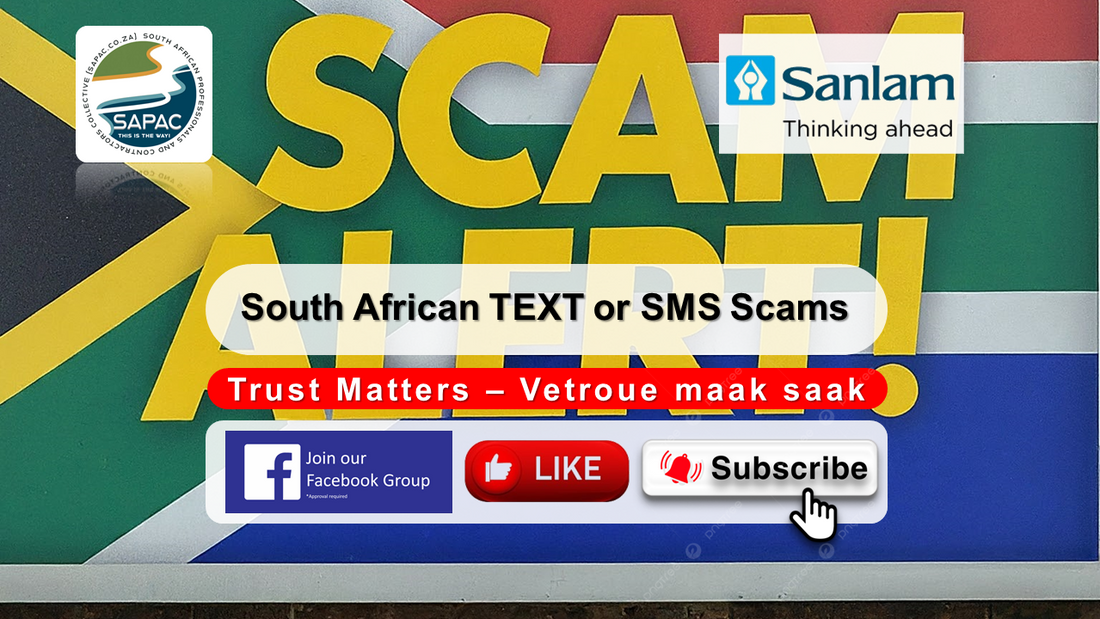
South African Text or SMS scams
SAPAC ReporterShare
South African Text or SMS Scams
Prepared by : Independent
Article Classification: Ways Scammers reach You
Image courtesy: SAPAC Professionals and Contractors
Get in contact with SAPAC:![]() Besoek | Visit https://sapac.co.za/
Besoek | Visit https://sapac.co.za/
📑 Complete Form: Link (PRESS HERE) FOR SAPAC
[GOEIE INFORMASIE] SLUIT AAN! https://bit.ly/JoinSAPAC
Areas: Southern Africa, Northern Cape, Western Cape, Cape Winelands, Free State, Gauteng, North West Province, Limpopo, Mpumalanga, Natal
South African Text or SMS scams
South African Scam messages look like they are from the government, businesses you deal with, have service contracts with or even your own family or friends to try to catch you out.
South African Text or SMS was the most reported contact method for scams last year. Scam messages sound urgent to get you to act quickly. They often have a link which will take you to a scam website. Scammers can steal any personal information entered on these scam websites and use it to take your money or commit fraud in your name.
To make these message look real, scammers spoof (copy) the phone number and sender ID of businesses or people you know. Scam messages can even appear in the same message chain as real messages from the organization or business entity, making them even harder to spot.
Warning signs it might be a scam
Stop and think. There's a good chance it's a scam if the message asks you to:
- take immediate action
- make a payment or transfer money
- click on a link or call a number provided in the message
- log on to an online account with your username and password or to provide other personal information
To rush you into acting, the text might also claim something urgent like:
- you or your accounts have been hacked or involved in fraudulent transactions
- there's problem with your payment or your supposed package delivery
- threatening you to stop a service or charge a fine if you don't act now.
Steps you can take to protect yourself
Never to click on links in messages
Search for the website yourself or use the organizations secure, authenticated app or portal to see if it is real.
Always do an independent check that the person is who they say they are.
- Don’t respond to a text or WhatsApp messages using the phone number provided. Stay clear of Cluttered WhatsApp groups especially if there is allot of admins.
- Call the organization or person back on a phone number you have found yourself (on their website or in the phone book) to check if the message was real.
-
Be suspicious of any job offer by text, especially without an interview or discussion. Research the person offering the position and only contact them using a phone number you've found yourself.
- You may contact SAPAC to check the credentials of self named contracting firms on WhatsApp groups.
- try to call them on the existing number you have for them if someone says they have a new numbers
- message them on the new number with a question only they would know the answer to check they are who they say they are.
Think you've been scammed?
1. Act fast to stop any further losses
Contact your bank or card provider immediately to report the scam. Ask them to stop any transactions.
Change passwords on all your devices and online accounts like email, banking, government sites and shopping sites.
2. Report the Scam
Once you have had the opportunity to have secured your details, you should open up a SAPS Case number, you can help us to try and stop the scammers or to warn other by reporting the scam to us. Depending on the nature of the scam site with a case number it can be listed.
3. Get help to recover
With your case number visit your nearest Department of Home Affairs and provide them with the information of your case including your signed affidavit. They should be able to capture the fact that your personal details may have been stolen and may be used for criminal activities. Visit their Website and make an appointment https://www.dha.gov.za/
Common Text or SMS scam types

|
South African Impersonation scamsIdentity theft is on the rise and is a type of fraud that involves using someone else`s identity to gain benefits or to steal money |
|
|
South African Jobs and employment scamsJobs and employment scams deceive you into handling over your money by offering you a "guaranteed" way to make money fast or a high-paying job for littles effort |
South Africa Current Time (SAPAC Time) - 24 Hour Format
South African Professionals and Contractors (SAPAC) Time


